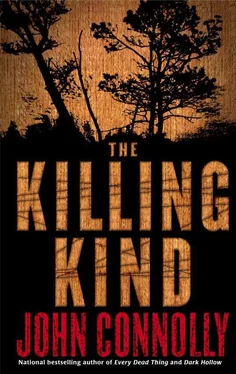“I'll keep it that way,” I replied.
He nodded. “Because if Pudd finds out that we talked, that we're moving against him, we're all dead. He'll kill us all.”
He shook my hand and turned away from me.
“You going to wish me luck?” I asked.
He stopped and looked back, shaking his head. “If you need luck,” he said softly, “you're already dead.”
Then he went back to his orchids and said no more.
Judge not the preacher, for he is thy Judge.
– GEORGE HERBERT,
“THE CHURCH-PORCH”
THE SEARCH FOR SANCTUARY
Extract from the postgraduate thesis of Grace Peltier…
There are few surviving photographs of Faulkner (certainly none taken after 1963) and few records of his past, so our knowledge of him is largely limited to the evidence of those who heard him speak or encountered him in the course of one of his healing missions.
He was a tall man with long dark hair and a high forehead, blue eyes beneath dark, straight eyebrows, and pale, almost translucent skin. He dressed in the garb of a working man-jeans, sometimes overalls, rough cotton shirts, boots-except when he was preaching. At those times he favored a simple black suit with a white collarless shirt buttoned to the neck. He wore no jewelry and his only concession to religious adornment was an ornate gold crucifix that hung around his neck as he spoke. Those who had the opportunity to examine it closely describe it as extremely finely made, with tiny faces and limbs carved into the body of the cross. The face of the Christ figure was almost photographically detailed, with the sufferings of the crucified man so clear and minutely rendered as to be disturbing, his agony beyond doubt.
I have been able to find no record of Faulkner in any of the established schools of divinity, and inquiries to churches, major and minor, have also failed to yield any clue as to the origins of his religious education, if any. His earlier life is barely documented, although we do know that he was born Aaron David Faulkner, the illegitimate son of Reese Faulkner and Embeth Thule of Montgomery, Alabama, in 1924. He was an undersized child, with seriously impaired sight in his left eye that would later render him unsuitable for military service, but he began to grow quickly in his midteens. According to those neighbors who remember him this physical growth was accompanied by a change in his personality, from shy and somewhat awkward to dominant and imposing. He lived alone with his mother until her death shortly before his sixteenth birthday. Following her funeral, Aaron Faulkner left Montgomery and never returned.
The next four years, up to the time of his marriage, are a blank, with some possible exceptions. An Aarn [sic] Faulkner was charged with assault in Columbia, South Carolina, in 1941, following an incident in which a prostitute named Elsa Barker was apparently pelted with rocks, sustaining injuries to her head and back. Barker failed to appear in court to give evidence, and her statement to the police being deemed unreliable, the case was dismissed. No trace of Elsa Barker was ever found again.
One other incident is worthy of note. In 1943, a family of three named Vogel from Liberty, Mississippi, went missing from their farm. They were found, two days after the search began, buried in a shallow grave one mile from their property. Quicklime had been used on the bodies. According to police reports, a young drifter had been staying with them in the days prior to their disappearance. The Vogels had taken him in because he seemed to be a religious man. None of the neighbors ever saw him or met him, but they recalled his name: Aaron. After their deaths, it was found that the Vogels were unmarried and their daughter was illegitimate. Among those questioned in the course of the investigation was Aaron Faulkner, following his apprehension at a motel in Vicksburg. He was released after three days due to lack of evidence.
(While there is no direct link between the deaths of the Vogels and the attack on, and subsequent disappearance of, the prostitute Elsa Barker, it is my contention that both incidents display signs of a violent response to perceived sexual transgression, possibly linked to sublimated sexual desire: respectively, the Vogels' unmarried relationship and the birth of their illegitimate daughter, with its echoes of Faulkner's own parentage, and the activities of Barker. I believe that Faulkner's later attempts to restrain and regulate sexual relationships at the Eagle Lake community represent a similar pattern of behavior.)
Following his marriage in 1944, Faulkner worked with a printer named George Lemberger in Richmond, Virginia, and remained with him for the next twelve years while earning a reputation as an untrained preacher. A dispute over his preaching activities, combined with allegations that Faulkner had forged Lemberger's signature on a check, eventually led to his departure from Lemberger's printing firm in early 1957, and he subsequently went north, accompanied by his wife and two children. For some time between 1958 and 1963, he eked out a living as an itinerant preacher, eventually establishing small congregations of worshipers in the Maine towns from which the original group of sixteen was drawn. He supplemented his income by working, at various times, as a printer, a laborer, and a fisherman.
Faulkner initially made his headquarters in a rooming house on Montgomery Street in Portland, Maine, owned by a cousin of the Jessops. He conducted services in the dining room, sometimes preaching to as many as thirty people. It was as a result of those first, lengthy, sermons that his reputation spread, leading to Faulkner enjoying a small but extremely devoted following.
Faulkner was not a preacher in the hellfire-and-brimstone mode. Instead, he drew his listeners to him with a tone of quiet insinuation, gradually worming his way into their consciousness. (If this description appears unnecessarily pejorative, it should be noted that the retrospective recollections of those to whom I spoke are largely negative where Faulkner is concerned. While it is clear that he exerted a great influence while he spoke, and that there were enough people willing to follow him to enable him to establish a much bigger community than the original Eagle Lake settlement, had he chosen to do so, there were many who felt an uneasiness around him.)
His wife, Louise, was by all accounts a strikingly beautiful woman, with dark hair only marginally longer than that of her husband. She did not associate with the Preacher's congregation: if he was approached after the service, she would remain standing behind him, listening to what passed between the Preacher and the supplicant, without passing comment or participating in any way. It seems to have been her constant unspeaking presence at her husband's side that made people wary of her, although two witnesses spoke of her intervening physically when her husband was accused of perpetrating acts of fraud during a healing service in Rumford, Maine, in 1963. She did so entirely in silence, but her strength and the nature of her intervention was sufficient to enable those who saw it to recall it in detail almost forty years later. Nevertheless, she always deferred to her husband and exhibited no signs of disobedience toward him, in line with fundamentalist religious doctrine.
Louise's own family, the Dautrieves, originally came from east Texas and were Southern Baptists. According to the recollection of family members, they appear to have been largely supportive of her decision to marry Faulkner, who was only nineteen when they met, regarding him as a man of good faith although he was not himself a Baptist. After their marriage there was little direct contact between Louise and her family, and surviving relatives say that there was no contact at all once she left for Eagle Lake.
Читать дальше












